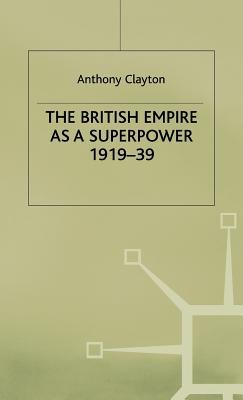
- We will send in 10–14 business days.
- Author: Anthony Clayton
- Publisher: Palgrave Macmillan
- ISBN-10: 033341263X
- ISBN-13: 9780333412633
- Format: 14 x 21.6 x 3.5 cm, kieti viršeliai
- Language: English
- SAVE -10% with code: EXTRA
Reviews
Description
In the decades between the wars, the British Empire reached its greatest extent, encompassing some 13 million square miles and 450 million individuals. though the seeds of the Empire's imminent decline had already been sown, Britain stood at the major force in global affairs because of the dismemberment of the old European powers in the war and the isolation of the ascendant non-European powers of the United States and the Soviet Union. With no further territorial ambitions of its own, the British Empire took on the role of a modern "superpower," seeking through the judicious use of military force and through diplomacy and economic power to preserve the fragile stability of the world.
Examining Britain's performance in its interwar role as a superpower, The British Empire as a Superpower, 1919-39 is an exhaustive account of the means by which imperial goals were translated into reality. Anthony Clayton traces the evolution of British imperial policy from the emphasis upon policing and internal security in the 1920s to the accelerating need for rearmament in the face of an ever-increasing likelihood that war would break out anew. Providing a sense of the day-to-day operation of the complex and far-flung imperial mechanism, Clayton carefully details Britain's use of all the resources at its command, including warships, aircraft, armies, police forces, irregular soldiers, and the China concession city volunteers.
Despite its military strength and vast territories, Great Britain was not finally successful in its role as a superpower. Global presence is not the equivalent of global power, and the Empire had neither the resources nor the unity to maintain world order. But, Clayton argues, British policy and the daily conduct of its administrators and military forces were far more praiseworthy than has often been understood. The Empire acted the inter-war years as a force for peace, and the imperial record, while not unblemished, was allied to the pursuit of freedom and human dignity.
EXTRA 10 % discount with code: EXTRA
The promotion ends in 22d.08:24:41
The discount code is valid when purchasing from 10 €. Discounts do not stack.
- Author: Anthony Clayton
- Publisher: Palgrave Macmillan
- ISBN-10: 033341263X
- ISBN-13: 9780333412633
- Format: 14 x 21.6 x 3.5 cm, kieti viršeliai
- Language: English English
In the decades between the wars, the British Empire reached its greatest extent, encompassing some 13 million square miles and 450 million individuals. though the seeds of the Empire's imminent decline had already been sown, Britain stood at the major force in global affairs because of the dismemberment of the old European powers in the war and the isolation of the ascendant non-European powers of the United States and the Soviet Union. With no further territorial ambitions of its own, the British Empire took on the role of a modern "superpower," seeking through the judicious use of military force and through diplomacy and economic power to preserve the fragile stability of the world.
Examining Britain's performance in its interwar role as a superpower, The British Empire as a Superpower, 1919-39 is an exhaustive account of the means by which imperial goals were translated into reality. Anthony Clayton traces the evolution of British imperial policy from the emphasis upon policing and internal security in the 1920s to the accelerating need for rearmament in the face of an ever-increasing likelihood that war would break out anew. Providing a sense of the day-to-day operation of the complex and far-flung imperial mechanism, Clayton carefully details Britain's use of all the resources at its command, including warships, aircraft, armies, police forces, irregular soldiers, and the China concession city volunteers.
Despite its military strength and vast territories, Great Britain was not finally successful in its role as a superpower. Global presence is not the equivalent of global power, and the Empire had neither the resources nor the unity to maintain world order. But, Clayton argues, British policy and the daily conduct of its administrators and military forces were far more praiseworthy than has often been understood. The Empire acted the inter-war years as a force for peace, and the imperial record, while not unblemished, was allied to the pursuit of freedom and human dignity.


Reviews